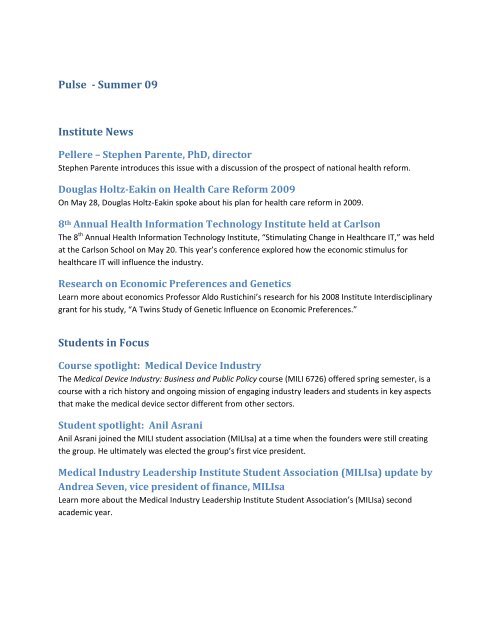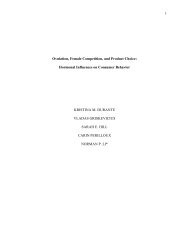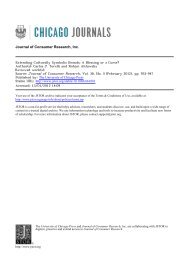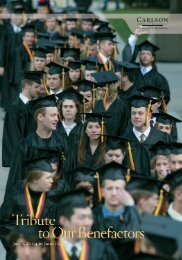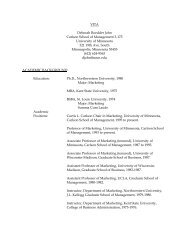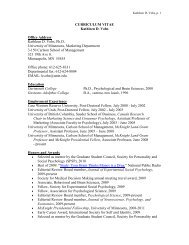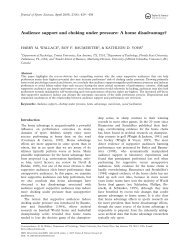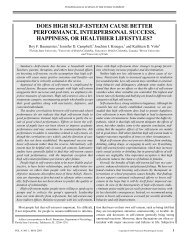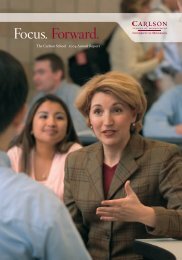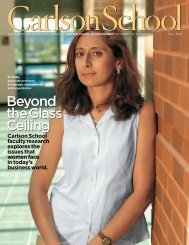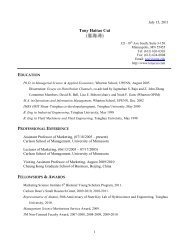Pulse - Summer 09 - Carlson School of Management - University of ...
Pulse - Summer 09 - Carlson School of Management - University of ...
Pulse - Summer 09 - Carlson School of Management - University of ...
Create successful ePaper yourself
Turn your PDF publications into a flip-book with our unique Google optimized e-Paper software.
<strong>Pulse</strong> <strong>Summer</strong> <strong>09</strong><br />
Institute News<br />
Pellere – Stephen Parente, PhD, director<br />
Stephen Parente introduces this issue with a discussion <strong>of</strong> the prospect <strong>of</strong> national health reform.<br />
Douglas HoltzEakin on Health Care Reform 20<strong>09</strong><br />
On May 28, Douglas Holtz‐Eakin spoke about his plan for health care reform in 20<strong>09</strong>.<br />
8 th Annual Health Information Technology Institute held at <strong>Carlson</strong><br />
The 8 th Annual Health Information Technology Institute, “Stimulating Change in Healthcare IT,” was held<br />
at the <strong>Carlson</strong> <strong>School</strong> on May 20. This year’s conference explored how the economic stimulus for<br />
healthcare IT will influence the industry.<br />
Research on Economic Preferences and Genetics<br />
Learn more about economics Pr<strong>of</strong>essor Aldo Rustichini’s research for his 2008 Institute Interdisciplinary<br />
grant for his study, “A Twins Study <strong>of</strong> Genetic Influence on Economic Preferences.”<br />
Students in Focus<br />
Course spotlight: Medical Device Industry<br />
The Medical Device Industry: Business and Public Policy course (MILI 6726) <strong>of</strong>fered spring semester, is a<br />
course with a rich history and ongoing mission <strong>of</strong> engaging industry leaders and students in key aspects<br />
that make the medical device sector different from other sectors.<br />
Student spotlight: Anil Asrani<br />
Anil Asrani joined the MILI student association (MILIsa) at a time when the founders were still creating<br />
the group. He ultimately was elected the group’s first vice president.<br />
Medical Industry Leadership Institute Student Association (MILIsa) update by<br />
Andrea Seven, vice president <strong>of</strong> finance, MILIsa<br />
Learn more about the Medical Industry Leadership Institute Student Association’s (MILIsa) second<br />
academic year.
First Medtronic Interdisciplinary Healthcare Case Competition engages<br />
<strong>University</strong> <strong>of</strong> Minnesota students in solving healthcare problems<br />
Student teams in the first Medtronic Interdisciplinary Healthcare Case Competition used<br />
collaboration and classroom learning to solve a real‐life strategy problem currently faced by the<br />
medical device industry.<br />
Focus on Faculty<br />
Faculty spotlight: Avner BenNer<br />
Find out about Center for Human Resources and Labor Studies Pr<strong>of</strong>essor Avner Ben‐Ner‘s research on<br />
for‐pr<strong>of</strong>it, nonpr<strong>of</strong>it, or government organizations.<br />
Faculty news and publications<br />
Faculty news, quotes, and presentations<br />
Alumni & Friends<br />
Alumni spotlight: Major Matthew Tarjick<br />
Matthew Tarjick, 2008 MBA is a major in the U.S. Army Medical Service Corps. Currently, he serves as<br />
the chief financial <strong>of</strong>ficer and business division chief for the U.S. Army Medical Department Activity at<br />
Fort Meade, Maryland. Matt served on active duty for eight years prior to entering the <strong>Carlson</strong> <strong>School</strong> <strong>of</strong><br />
<strong>Management</strong>’s MBA program.<br />
Give to the Institute<br />
Alumni and friends <strong>of</strong> the <strong>Carlson</strong> <strong>School</strong> <strong>of</strong> <strong>Management</strong> support the mission <strong>of</strong> both the school and the<br />
Institute in many ways—by mentoring students, volunteering time with faculty and staff, and by<br />
contributing financially.
Institute News<br />
Pellere – Stephan Parente, PhD, director<br />
America is once again contemplating the prospect <strong>of</strong> national health reform. This will be the seventh<br />
attempt at national reform legislation since the Wilson Administration in 1919. Will seven be the lucky<br />
number? In the last few months faculty, students, and industry leaders have begun to engage in a series<br />
<strong>of</strong> discussions to inform and contribute. Ten students in the MBA Healthcare Marketplace courses<br />
submitted health reform proposal ideas to the national Kaiser Foundation competition with one<br />
<strong>University</strong> <strong>of</strong> Minnesota public health administration student declared the winner. Senior<br />
undergraduate students staged a mock Senate Finance Committee debate on health reform proposals<br />
this past winter. Former Congressional Budget Office Director Doug Holtz‐Eakin spoke before business<br />
leaders as well as students and faculty from four colleges at the <strong>University</strong> to outline a pragmatic<br />
bipartisan approach to health reform should tenacity and willingness to compromise become the order<br />
<strong>of</strong> this iteration. This level <strong>of</strong> engagement by faculty and students, as well as by policy makers, betrays<br />
an unrelenting hope and desire to improve the medical industry for the long haul. I am an honored to<br />
work with such a community that seeks to not only study the features <strong>of</strong> reform, but lead and engage<br />
stakeholders in order to develop economically sustainable innovation to not only advance the industry,<br />
but to enhance and grow a healthy and prosperous society. Pellere.<br />
Douglas HoltzEakin on Health Care Reform 20<strong>09</strong><br />
On May 28, Douglas Holtz‐Eakin spoke on the prospects for health care reform in 20<strong>09</strong>. Holtz‐Eakin is<br />
the president <strong>of</strong> DHE Consulting, LLC and most recently served as director <strong>of</strong> domestic and economic<br />
policy for the John McCain presidential campaign. He was also a recent senior fellow at the Peter G.<br />
Peterson Institute for International Economics, the director <strong>of</strong> the Maurice R. Greenberg Center for<br />
Geoeconomic Studies and the Paul A. Volcker Chair in International Economics at the Council on Foreign<br />
Relations. Prior to that, Holtz‐Eakin served as the sixth director <strong>of</strong> the Congressional Budget <strong>of</strong>fice where<br />
he was appointed for a four‐year term in 2003.<br />
Holtz‐Eakin discussed the prospects for comprehensive, bi‐partisan health care reform. He outlined a<br />
potential proposal, a political strategy for implementation, and the likely impact <strong>of</strong> its adoption. The<br />
plan that Holtz‐Eakin discussed addresses dysfunctions in the existing health care delivery system;<br />
expands access to affordable private health insurance in an incremental and fiscally responsible manner;<br />
and improves market‐based options for consumer access to information on health care quality. He<br />
detailed his plan with four principles and their matching reforms. The Manhattan Institute has published<br />
his plan in a paper, “Forging a new plan for health care: principles and priorities for sustainable reform.”
8 th Annual Health Information Technology Institute held at <strong>Carlson</strong><br />
The 8 th Annual Health Information Technology Institute, “Stimulating Change in Healthcare IT,” was held<br />
at the <strong>Carlson</strong> <strong>School</strong> on May 20. This year’s conference explored how the economic stimulus for<br />
healthcare IT will impact the industry. Attendees learned about changes and innovations that are<br />
already happening. The first keynote speaker was Brian Osberg, assistant commissioner <strong>of</strong> healthcare at<br />
the Minnesota Department <strong>of</strong> Human Services. Osberg discussed the Minnesota’s HIT strategy, the role<br />
<strong>of</strong> HIT in the State’s healthcare reform agenda, and the structure and process going forward to<br />
implement HIT strategies.<br />
The second keynote was Howard Burde, Esquire <strong>of</strong> Howard Burde Health Law, LLC. Burde spoke on<br />
“Opportunities, Obligations, and Risks under the American Reinvestment and Recovery Act.” He gave<br />
specifics on how the stimulus package money can be accessed, the new rules for “covered entities and<br />
business associates,” and the risks for all health care industry participants.<br />
Conference participants included IT pr<strong>of</strong>essionals, hospital and health plan executives, nurses,<br />
physicians, and members <strong>of</strong> academia. They left the program with a better understanding <strong>of</strong> the<br />
measures used to determine incentive payments, the ability to identify possible technical solutions for<br />
patient education using IT resources, and deeper knowledge used in determining incentives for IT.<br />
For more information on the Minnesota Chapter <strong>of</strong> the Healthcare Information and <strong>Management</strong><br />
Systems Society, go to: http://www.himss‐mn.org/<br />
Research on Economic Preferences and Genetics<br />
Economics Pr<strong>of</strong>essor Aldo Rustichini was awarded an Institute Interdisciplinary grant in 2008 for his<br />
study, “A Twins Study <strong>of</strong> Genetic Influence on Economic Preferences.” Rustichini has been conducting<br />
research for this grant over the past year with <strong>Carlson</strong> <strong>School</strong> Pr<strong>of</strong>essor <strong>of</strong> Accounting John Dickhaut and<br />
industry partner Merck & Co. Their project utilizes economic theory to explain economic choices with<br />
the individual’s preferences (i.e., acquiring or not acquiring medical insurance; saving versus<br />
consumption) and the consequences <strong>of</strong> those choices. Rustichini’s team recently completed two studies<br />
that suggest preferences are correlated with IQ personality traits and biological features. They found<br />
that higher IQ is associated with more prudent behavior in inter‐temporal choices (higher saving) but<br />
also higher willingness to take risks in choices under uncertainty. These findings suggest that choice is<br />
essentially an information process, affected in a significant way by cognitive skill. Using this theory, the<br />
research team is studying twins, comparing the similarity between identical and non‐identical twins. If<br />
the trait similarity is found to be significantly higher among identical twins, then the trait will be more<br />
likely influenced by genetic factors.<br />
Pr<strong>of</strong>essor Rustichini received his PhD. from the <strong>University</strong> <strong>of</strong> Minnesota in 1987. He teaches and does<br />
research in the areas <strong>of</strong> microeconomic theory, game theory, mathematics for economists, decision<br />
theory, and political economy.<br />
For more information on Pr<strong>of</strong>essor Rustichini: http://www.econ.umn.edu/faculty/arust/
Students in Focus<br />
Course spotlight: Medical Device Industry<br />
The Medical Device Industry: Business and Public Policy course (MILI 6726) <strong>of</strong>fered spring semester, is a<br />
course with a rich history and ongoing mission <strong>of</strong> engaging industry leaders and students in key aspects<br />
that make the medical device sector different from other sectors. The course covers the unique<br />
business, market, public policy, regulatory, and technology management issues <strong>of</strong> the medical device<br />
industry, including:<br />
• the historical development, importance, and future direction <strong>of</strong> the medical device industry;<br />
• FDA issues, policies and strategies, public and private sector insurance coverage and<br />
reimbursement;<br />
• interaction between public policies and private sector actions; intellectual property (IP) and<br />
liability issues concerning medical technology;<br />
• key issues relating to the start‐up and management <strong>of</strong> new medical technology firms.<br />
With the help <strong>of</strong> industry executives, especially Dale Olseth, Pr<strong>of</strong>essors Robert Connor and Susan Foote<br />
created the medical device industry course in 2000. Ten years later, it continues to actively engage<br />
students ‐ the future generation <strong>of</strong> industry leaders, with executives ‐ the current generation <strong>of</strong> industry<br />
leaders.<br />
MBA student Andrea Seven said, "If you currently work in the med device industry or are interested in<br />
transitioning to it, I would recommend this course. Pr<strong>of</strong>essor Connor provides students with a very<br />
unique overview <strong>of</strong> the industry, including the topics <strong>of</strong> regulatory, venture capital, reimbursement,<br />
patents ... and all other topics that touch the life <strong>of</strong> a device. Students are given direct access to over 20<br />
guest faculty lecturers (almost every class) including the Twin Cities' leading experts. It’s a fantastic<br />
opportunity to learn from and ask questions <strong>of</strong> the best!"<br />
Industry leaders from the following organizations have been engaged in the course: Acorn<br />
Cardiovascular, Atritech, Berman Medical, Blue Cross Blue Shield, Boston Scientific, Celleration, CHF<br />
Solutions, CVRx, Devicix, EnteroMedics, Epitek, Lifecore Biomedical, Lundberg & Woessner, Medica<br />
Health Plans, Medtronic, UM Office <strong>of</strong> Technology Commercialization, Piper Jaffray, Princeton<br />
Reimbursement Group, QRS Diagnostic, Robins, Kaplan, Miller & Ciresi, SightLine Partners, Silicon Valley<br />
Bank, St. Jude Medical, SurModics, Thomas McNerney & Partners, United Health Group, Urologix,<br />
Venturi Group, and Vital Images.<br />
In a note to Pr<strong>of</strong>essor Connor, a student wrote, "I just wanted you to know that I appreciate the efforts<br />
you put into structuring this class and providing balanced insight into so many business aspects <strong>of</strong> the<br />
medical device industry. Having worked in this industry for the past six years, I still felt that I got<br />
tremendous knowledge out <strong>of</strong> it...[and] have recommended it to many colleagues and employees here<br />
at Medtronic." Response from engaged industry leaders were exemplified in a comment from a recent<br />
guest lecturer who wrote ‐‐ "I enjoyed the session very much... I appreciate the opportunity to weigh in<br />
on future business needs for device solutions to patient problems.
Student spotlight: Anil Asrani<br />
Anil Asrani began the <strong>Carlson</strong> Part Time MBA program in the fall <strong>of</strong> 2006 after having received his<br />
bachelor <strong>of</strong> science in biology from the College <strong>of</strong> William and Mary in 1995. Employed for 10 years in<br />
clinical research at the Universities <strong>of</strong> Virginia and Minnesota, Anil published on extracellular matrix<br />
proteins and molecular virology relating to HIV, respectively. While at <strong>Carlson</strong> he successfully completed<br />
his MBA as a <strong>Carlson</strong> Scholar (graduating in the top 10% <strong>of</strong> his class <strong>of</strong> 382 people), led two student<br />
groups, was selected to study abroad on the 3M Vienna Seminar via a <strong>Carlson</strong> Family Foundation<br />
scholarship, earned a Medical Industry Specialization, gained critical experience as a consultant for<br />
Fortune 500 companies, published three journal articles in his field, and ran his own investment<br />
property business. Upon graduation from <strong>Carlson</strong> in May <strong>of</strong> 20<strong>09</strong>, Anil’s involvement in these activities<br />
was recognized: he was selected as the Part Time MBA Student <strong>of</strong> the Year. This honor is bestowed<br />
upon one or two individuals from each year’s graduating class for outstanding overall achievement.<br />
While attending <strong>Carlson</strong>, Anil’s interest in MILI’s Medical Industry Specialization grew and he became<br />
heavily involved in its coursework as well as its student association (MILIsa). Anil’s best experiences<br />
during the specialization were participating in the Medical Technology Evaluation course with Dr.<br />
Stephen Parente, where he was able to work for three clients ‐ The Mayo Clinic, UnitedHealth Group,<br />
and Medtronic ‐‐ to develop medical technologies while learning how to critically evaluate the medical<br />
industry’s major stakeholders’ perspectives regarding innovative products and services. During the<br />
course, six projects were selected for development, one <strong>of</strong> which was Anil’s idea. Anil also participated<br />
in <strong>Carlson</strong>’s yearlong New Product Design and Business Development course, where he was the team<br />
leader <strong>of</strong> a cross‐functional group that was tasked with developing a new medical device for Medtronic’s<br />
cardiovascular division. He worked with another MBA, an MHA, two biomedical engineers, and a<br />
mechanical engineer to develop a device that will be launched in 2010. When asked about these<br />
courses, Anil said, “There is absolutely no substitute for this kind <strong>of</strong> hands‐on learning and real‐world<br />
experience; more classes at <strong>Carlson</strong> could benefit greatly by being taught in this way.”<br />
Anil also joined MILIsa at a time when the founders were still creating the group. He ultimately was<br />
elected the group’s first vice president. Together the leaders were able to grow membership from five<br />
<strong>of</strong>ficers to 220+ members and growing. They also set up a website that <strong>of</strong>fered online chatting<br />
capabilities and podcasts <strong>of</strong> their programming. The programming this year included a town hall‐style<br />
meeting with medical device entrepreneur Michael Berman, a bi‐weekly lunch series featuring a variety<br />
<strong>of</strong> entrepreneurs/leaders in the medical industry, and an open‐to‐the‐public, non‐partisan, pre‐election<br />
Healthcare Policy Panel to inform voters <strong>of</strong> the candidates’ positions and their effects on key<br />
stakeholders in the medical industry. MILIsa currently reaches out to students within and beyond<br />
<strong>Carlson</strong>’s walls for their membership, i.e. students <strong>of</strong> the Academic Health Center and engineering<br />
schools. MILIsa’s mission is best exemplified by the Medtronic Interdisciplinary Healthcare Case<br />
Competition that debuted on April 16, 20<strong>09</strong> at <strong>Carlson</strong>, which Anil personally pitched to a senior<br />
executive at Medtronic. MILIsa envisions that this competition will not only unite students from<br />
disparate programs at the <strong>University</strong> <strong>of</strong> Minnesota to learn together, as it did this year, but will quickly<br />
grow to include students from other U.S. schools as early as next year. The competition will allow the
nation to witness what MILI participants already know: that <strong>Carlson</strong> is the premier place to get an MBA<br />
with a Medical Industry Specialization.<br />
In addition to his pr<strong>of</strong>essional accomplishments, Anil was married in December <strong>of</strong> 2007 to his best<br />
friend, Laura, and is now the proud father <strong>of</strong> Arabella Grace Asrani, who was born on May 27, 20<strong>09</strong>. This<br />
summer, Anil will also begin his career at Devicix, a medical device design firm located in Eden Prairie,<br />
MN, as the Director <strong>of</strong> Strategic Marketing. Regarding his new career, Anil said, “I just wouldn’t feel<br />
confident entering an entirely new field, like the medical device industry, without the comprehensive<br />
training and analysis that I was exposed to during my Medical Industry Specialization.”<br />
Medical Industry Leadership Institute Student Association (MILIsa) update by<br />
Andrea Seven, vice president <strong>of</strong> finance, MILIsa<br />
The Medical Industry Leadership Institute Student Association (MILISA) recently completed its second<br />
academic year and continues to pursue its mission <strong>of</strong> fostering a strong interdisciplinary network <strong>of</strong><br />
students, faculty, alumni, and industry representatives who share a common passion for the healthcare<br />
industry.<br />
Throughout the 2008‐<strong>09</strong> academic year, MILISA provided a robust array <strong>of</strong> programming for students<br />
interested in the industry. Programming included a variety <strong>of</strong> executive speaking engagements, the<br />
Healthcare Policy Discussion Panel preceding the presidential election, networking events and the<br />
extremely successful, first annual Medtronic Interdisciplinary Healthcare Case Competition (MEDIHCC).<br />
In addition, the organization provides programming for students by collaborating with other<br />
organizations including Life Science Alley, <strong>Carlson</strong>’s’ Ventures Plus, SPH – Division <strong>of</strong> Health Policy and<br />
<strong>Management</strong>, the <strong>University</strong> <strong>of</strong> St. Thomas, and the Design <strong>of</strong> Medical Devices Conference.<br />
MILISA recently held its second <strong>of</strong>ficer election during which five new <strong>of</strong>ficers were elected for the 20<strong>09</strong>‐<br />
10 academic year.<br />
• President: Nathan Rajalingam. Nathan is a 2010 MBA candidate currently spending his summer<br />
internship at the Target Corporation.<br />
• Vice President <strong>of</strong> External Relations: Robert John Ed. Robert is a 2010 MBA candidate and is<br />
currently employed as an intern in marketing with Boston Scientific.<br />
• Vice President <strong>of</strong> Internal Relations: Juli Tidwell. Juli is a 20<strong>09</strong> MBA candidate and works for the<br />
<strong>University</strong> <strong>of</strong> Minnesota’s Division <strong>of</strong> Pediatric Oncology as a regulatory specialist.<br />
• Vice President <strong>of</strong> Programming: Jason Rusinak. Jason is a 2010 MBA candidate and is working<br />
on a project with the Minnesota Nurses Association this summer.<br />
• Vice President <strong>of</strong> Finance: Andrea Seven. Andrea is a 2010 MBA candidate currently serving as<br />
an Education Pioneers Fellow with Chicago Public <strong>School</strong>s’ Office <strong>of</strong> <strong>School</strong> Turnaround.<br />
The MILISA <strong>of</strong>ficers look forward to further engagement with the <strong>University</strong> and the business<br />
community through a variety <strong>of</strong> medical industry related events that will help to prepare its members<br />
for leadership roles in the medical industry.
Through these events and activities, MILISA is committed to establishing its student membership as<br />
among the most prepared to enter into new leadership roles in the medical industry. For more<br />
information about the group, email milisa@umn.edu.<br />
First Medtronic Interdisciplinary Healthcare Case Competition engages<br />
<strong>University</strong> <strong>of</strong> Minnesota students in solving healthcare problems<br />
Student teams in the first Medtronic Interdisciplinary Healthcare Case Competition used<br />
collaboration and classroom learning to solve a real‐life strategy problem currently faced by the<br />
medical device industry. The competition, sponsored by Medtronic, Inc. (NYSE: MDT), was held<br />
April 17‐23 and hosted by the Medical Industry Leadership Institute's student association<br />
(www.milisa.org) at the <strong>University</strong> <strong>of</strong> Minnesota’s <strong>Carlson</strong> <strong>School</strong> <strong>of</strong> <strong>Management</strong>.<br />
Designed to support innovation and leadership in the healthcare and medical device industries,<br />
the competition involved graduate students from the <strong>University</strong>’s Master <strong>of</strong> Business<br />
Administration (MBA), Master <strong>of</strong> Public Health (MPH), Master <strong>of</strong> Healthcare Administration<br />
(MHA), Master <strong>of</strong> Science in <strong>Management</strong> <strong>of</strong> Technology (MOT), and Master <strong>of</strong> Public Policy<br />
(MPP) programs as well as the Law <strong>School</strong>, Institute <strong>of</strong> Technology, and Medical <strong>School</strong>.<br />
“The competition provided student participants with a rare opportunity to network and learn<br />
together, while producing innovative solutions that draw on their respective fields <strong>of</strong> expertise<br />
and study,” says Steve Parente, associate pr<strong>of</strong>essor <strong>of</strong> finance and director <strong>of</strong> the Medical<br />
Industry Leadership Institute at the <strong>Carlson</strong> <strong>School</strong>. “We expect the event to grow to include<br />
graduate students in other academic areas as well as students from outside the <strong>University</strong>.”<br />
The Medical Industry Leadership Institute puts executives, physicians, students, and academic<br />
leaders in touch with the latest trends in the medical industry through MBA education,<br />
executive education, research, and market development. The Institute’s student association<br />
developed the idea <strong>of</strong> an interdisciplinary healthcare case competition and gained the financial<br />
support <strong>of</strong> Medtronic as a corporate sponsor <strong>of</strong> the event.<br />
During this debut competition, eight graduate student teams competed. Composed <strong>of</strong> three to<br />
six members, each team was required to have at least one MBA, one MHA and one MPH<br />
student on its roster. Every team had 36 hours to analyze a current business case provided by<br />
Medtronic and prepare a presentation. During the first round <strong>of</strong> presentations, student teams<br />
presented their findings to faculty judges from the <strong>University</strong> <strong>of</strong> Minnesota. Next, the three top<br />
teams moved on to the final round <strong>of</strong> competition and presented to a panel <strong>of</strong> Medtronic<br />
executives at Medtronic World Headquarters. This year’s winners and their graduate degree<br />
programs were:
• First‐place team: Eric Henningsen, MBA; Sarah Klawitter, MPH; Kaustubh Patil, MS; Scott<br />
Tran, MHA/MBA; Ylan Kazi, MHA; and Niketa Walawalkar, MPH.<br />
• Second‐place team: Ryan Chaquette, MHA/MBA; Joseph Pham, MPH; Michelle Sotak, MBA;<br />
John Reed, MBA; and Christina Small, MBA.<br />
• Third‐place team: Eric Barrette, PhD Health Services Research, Policy & Admin; Kate Bautch,<br />
MBA; Katie Tastad, MPH; Varun Garg, MHA; Peter Graven, PhD HPM; and German Mendivil,<br />
MBA.<br />
Focus on Faculty<br />
Faculty spotlight: Avner BenNer<br />
Center for Human Resources and Labor Studies Pr<strong>of</strong>essor Avner Ben‐Ner wonders – would it make a<br />
difference whether children go to a for‐pr<strong>of</strong>it, nonpr<strong>of</strong>it, or government childcare center,<br />
elementary school, or college? Would you prefer to place an elderly relative – or end up yourself –<br />
in a for‐pr<strong>of</strong>it, nonpr<strong>of</strong>it, or local government nursing home? Are there significant differences<br />
among for‐pr<strong>of</strong>it, nonpr<strong>of</strong>it, and government organizations in the way in which they are structured,<br />
what they produce, and how they produce it? Does organization ownership matter? Ben‐Ner has<br />
researched this field specifically comparing organizational performance in nonpr<strong>of</strong>it, for‐pr<strong>of</strong>it, and<br />
local government nursing homes in Minnesota. In 2008, Ben‐Ner, along with co‐principal investigator<br />
Pinar Karaca‐Mandic from the <strong>School</strong> <strong>of</strong> Public Health, was awarded an Institute interdisciplinary grant<br />
to study, “Does Ownership Matter in the Selection <strong>of</strong> Nursing homes? Evidence from Consumer<br />
Surveys.”<br />
Ben‐Ner’s research interests focus on:<br />
• structure and performance in for‐pr<strong>of</strong>it, nonpr<strong>of</strong>it, and government organizations,<br />
• human resource management and firm performance,<br />
• the role <strong>of</strong> identity, personality, cognitive ability, ethics and values, and <strong>of</strong> social, religious, and<br />
cultural influences on trust and cooperation, behavior and organizational design,<br />
• the place <strong>of</strong> for‐pr<strong>of</strong>it, nonpr<strong>of</strong>it, and government sectors in the new economy.<br />
Ben‐Ner is also currently working with Darla Flint on a project evaluating the effects <strong>of</strong> working on a<br />
treadmill while working on job performance. This is a project initiated by James Levine, pr<strong>of</strong>essor and<br />
doctor at the Mayo Clinic. Levine is a leading researcher <strong>of</strong> NEAT (non‐exercise activity thermogenesis)<br />
the calories people burn doing everyday activities such as standing, walking, or even fidgeting. Levine<br />
and his team developed an alternative to the traditional cubicle – workstations that combine computer,<br />
desk, and treadmill into one unit. They have also implemented other ways to keep people moving while<br />
at work.
Pr<strong>of</strong>essor Avner Ben‐Ner has been a pr<strong>of</strong>essor in the <strong>Carlson</strong> <strong>School</strong>’s department <strong>of</strong> human resources<br />
and industrial relations since 1988. He received his PhD and MA in economics from the State <strong>University</strong><br />
<strong>of</strong> New York at Stony Brook.<br />
Faculty news and publications<br />
• Stephen Parente testified before the Congressional Subcommittee on Health's hearing on<br />
comprehensive health reform, Tuesday, June 23, 20<strong>09</strong>. He was a member <strong>of</strong> the panel on health<br />
reform coalition views.<br />
• On April 10, 20<strong>09</strong>, Murray Frank was interviewed for the Minnesota Public Radio Story, "Some<br />
stimulus funds might land in unexpected places."<br />
• Stephen Parente was quoted in the June 19, 20<strong>09</strong> Milwaukee‐Wisconsin Journal Sentinel article,<br />
"President pressing health care overhaul."<br />
• Dahl D, Sengupta J, and Vohs KD. 20<strong>09</strong>. “Sex in Advertising: Gender Differences and the Role <strong>of</strong><br />
Relationship Commitment.” Journal <strong>of</strong> Consumer Research 36: electronically published January<br />
9, 20<strong>09</strong>.<br />
• Stephen Parente's research was mentioned in the April 23rd Business Week article, "The<br />
Dubious Promise <strong>of</strong> Digital Medicine: GE, Google, and others, in a stimulus‐fueled frenzy, are<br />
piling into the business. But electronic health records have a dubious history."<br />
• O'Connor PJ, Sperl‐Hillen JM, Johnson P, Rush WA, Asche S, Dutta P, and Blitz G. 20<strong>09</strong>.<br />
“Simulated physician learning intervention to improve safety and quality <strong>of</strong> diabetes care: a<br />
randomized trial.” Diabetes Care 32 (4): 585‐590.<br />
• Stephen Parente's interstate health insurance market research was mentioned in the April 9,<br />
20<strong>09</strong> New York Times article, "Op‐Ed Contributor: The Misguided Quest for Universal Coverage."<br />
• Stephen Parente was quoted in the Minneapolis Star Tribune article, "Hospitals forced to<br />
become bill collectors" on April 1, 20<strong>09</strong>.<br />
• The March 11, 20<strong>09</strong>, Science Centric article, "U <strong>of</strong> Minnesota Researchers Examine the Value <strong>of</strong><br />
Health Information Technology" quoted research done by Stephen Parente.<br />
• Zhang Y, Sweet RM, Metzger GJ, Burke D, Erdman AG, and Timm GW. 20<strong>09</strong>. “Advanced finite<br />
element mesh model <strong>of</strong> female SUI research during physical and daily activities.” Stud. Health<br />
Technol. Inform. 142: 447‐452.<br />
• Stephen Parente was quoted on March 10, 20<strong>09</strong> on the FOX‐TV story, "Study: Health IT Doesn't<br />
Help Patient Safety"<br />
• Stephen Parente was part <strong>of</strong> a national panel <strong>of</strong> experts debating the creation <strong>of</strong> a Federal<br />
Health Board to improve the country’s healthcare system. The panel, which was organized by<br />
the Medical Banking Project and the Mayo Clinic Health Policy Center, met at the Seventh<br />
National Medical Banking Institute March 12 in Nashville, Tenn. The debate can be viewed at<br />
• O'Connor PJ, Sperl‐Hillen JM, Johnson P, Rush WA, and Crain A. 20<strong>09</strong>. “Customized feedback to<br />
patients and providers failed to improve safety or quality <strong>of</strong> diabetes care: A randomized trial.”<br />
Diabetes Care ahead <strong>of</strong> print online publishing date 4/14/<strong>09</strong>.<br />
• Parente ST, and McCullough JS. 20<strong>09</strong>. “Health information technology and patient safety:<br />
evidence from panel data.” Health Aff. (Millwood.) 28 (2): 357‐360.<br />
• Parente ST. 20<strong>09</strong>. “Health Information Technology and Financing's Next Frontier: The Potential<br />
<strong>of</strong> Medical Banking.” Business Economics 44 (1): 41‐50.<br />
• Zhang Y, Kim S, Erdman AG, Roberts KP, and Timm GW. 20<strong>09</strong>. “Feasibility <strong>of</strong> Using a Computer<br />
Modeling Approach to Study SUI Induced by Landing a Jump” Ann. Biomed. Eng.<br />
Alumni & Friends<br />
Alumni spotlight: Major Matthew Tarjick<br />
Matthew Tarjick, 2008 MBA is a major in the U.S. Army Medical Service Corps. Currently, he serves as<br />
the chief financial <strong>of</strong>ficer and business division chief for the U.S. Army Medical Department Activity at<br />
Fort Meade, Maryland. Kimbrough Ambulatory Care Clinic is the parent medical facility to three<br />
subordinate Army clinics and over 10 outlying support clinics, providing primary care to over 40,000<br />
active duty service members and their families, military retirees, and 200 Warriors in Transition. In this<br />
role, Matt oversees all resourcing decisions, including budget and accounting responsibilities, pursuing<br />
venture capital funding, conducting business case analysis to determine the feasibility <strong>of</strong> new initiatives,<br />
third party collections, and supporting the strategic direction <strong>of</strong> the medical activity.<br />
Matt served on active duty for eight years prior to entering the <strong>Carlson</strong> <strong>School</strong> <strong>of</strong> <strong>Management</strong>’s MBA<br />
program. Prior to <strong>Carlson</strong>, Matt was a company commander on two separate occasions, a platoon leader<br />
in the 82 nd Airborne Division to include a combat tour in Afghanistan, and Assistant Chief <strong>of</strong> Operations<br />
on the 82 nd Airborne Division G‐3 staff. While at the <strong>Carlson</strong> <strong>School</strong>, Matt pursued a broad spectrum <strong>of</strong><br />
courses in entrepreneurship, medical industry leadership, finance, and marketing. “My aim was to take<br />
the courses that I was most interested in, rather than the courses that fulfilled a specific area <strong>of</strong><br />
concentration. The Army values well‐rounded leaders.”<br />
Following graduation from the full time program in May 2008, Matt began a one‐year Health Services<br />
Comptroller Internship program at Walter Reed Army Medical Center in Washington, D.C. At the<br />
conclusion <strong>of</strong> the internship program, Matt successfully passed his oral boards to become a board<br />
certified Health Services Comptroller.<br />
Ultimately, Matt intends to serve on active duty for at least 20 years, progressing to CFO <strong>of</strong> an inpatient<br />
facility, followed by an Army Medical Center, and then as a Deputy Commander for Administration<br />
(Chief <strong>of</strong> Staff) and, ultimately, as Hospital Commander (CEO).<br />
Beyond his Army career, Matt and his wife, Dr. Angela Tarjick, DC also opened a chiropractic and natural<br />
care center in Edgewater, Maryland. There, he serves as the director <strong>of</strong> business operations. “My<br />
<strong>Carlson</strong> education prepared me well to function as a leader in both organizations. On the one hand, I am<br />
the CFO <strong>of</strong> a $100M+ organization and on the other hand, I handle the finance, accounting, marketing,<br />
external relationships, HR functions, and anywhere else I am needed for a start‐up business. It’s been<br />
challenging, yet extremely rewarding. It’s amazing to see our vision and elements <strong>of</strong> our business plan<br />
become a reality.”<br />
In addition to being a MILI affiliate, Matt is a member <strong>of</strong> the American College <strong>of</strong> Healthcare Executives<br />
and the American Society <strong>of</strong> Military Comptrollers. Because Matt lives in Maryland, it is difficult to
emain active in MILI. However, whenever possible, Matt continues to work with students by discussing<br />
career options and pr<strong>of</strong>essional development opportunities. If you would like to contact Matt, feel free<br />
to email him at mtarjick@gmail.com.<br />
Give to the Institute<br />
Alumni and friends <strong>of</strong> the <strong>Carlson</strong> <strong>School</strong> <strong>of</strong> <strong>Management</strong> support the mission <strong>of</strong> both the school and the<br />
Institute in many ways—by mentoring students, volunteering time with faculty and staff, and by<br />
contributing financially. The <strong>Carlson</strong> <strong>School</strong> relies on more than 3,000 benefactors annually.<br />
You can also support the mission <strong>of</strong> the Institute by assisting financially with your contribution. There<br />
are three main areas <strong>of</strong> need and your financial support would make a positive impact in the success<br />
and growth <strong>of</strong> the Institute. Below are areas where gifts are needed most:<br />
• Program Support Fund (# 5295): General operating costs: contributions provide the necessary<br />
flexible funds to support daily operations needed to maintain key initiatives.<br />
• Research Support Fund (#36<strong>09</strong>): General research expenses: contributions provide funds for the<br />
Institute’s interdisciplinary grant awards program as well as further its research portfolio.<br />
• MILI Discovery Fund (#6087): Experiential learning support <strong>of</strong> the course ‐ Medical Industry<br />
Valuation Laboratory: contributions provide funds for initiatives and educational experiences<br />
that facilitate market valuations <strong>of</strong> new innovations for the medical industry, and enhance the<br />
potential to bring new technologies to market.<br />
There are many areas <strong>of</strong> need and many ways for friends and alumni to make a positive impact on<br />
the school today and into the future.


